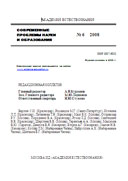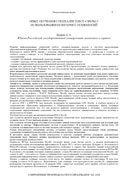PDF-версия статьи


|
As one of the main institutions of socialization of the individual, educational institution plays a special role in the formation of the legal culture of the student, purposefully forming a full member of society, able to navigate the legal environment and act with full awareness of responsibility for their decisions and actions. The assimilation of legal knowledge becomes more effective if they are studied together with the realities of life. Now, when the society is overwhelmed by a wave of crime, it is especially important to timely bring into action such means of prevention of offenses and crimes as the formation of law-abiding citizens, paying special attention to the ability to obtain legal information and use it, and this means to think, make decisions, effectively and conflict-free to solve life problems, which adapts the student to an independent and autonomous existence after school[1].
Intensive puberty, rapid physiological restructuring of the body, and at the same time unstable emotional sphere, bursts and uncontrollability of emotions and moods cause problems in the social contacts of the teenager. In adolescence, the student persistently strives for self-assertion, and the leading activity in this period is communication with peers, in which he learns new norms of behavior. From the point of view of legal education it should be noted that the teenager already acts as a subject of legal relations. He formed his own views on the rights and duties of people. He opposes the dictates of adults. Can argue with teachers, parents about their rights.
Psychological neoplasms of the personality of a teenager, to which the authors attribute the emergence of social consciousness and self-consciousness and self - determination also oblige teachers and parents to be more sensitive to the problems of legal education of adolescents. At the same time, diagnostics of the level of legal education of schoolchildren plays an important role in the formation of legal culture of adolescents, without which it is impossible to trace the legal process and give a timely and objective assessment of its results.
To monitor the level of legal culture, it is very important to organize the diagnosis of the level of legal education of adolescents, which in turn requires the development of criteria and indicators of the formation of legal culture.
The development of pedagogical measures of formation of legal culture of students of adolescence requires the analysis of the concept of "legal culture", the structure of which gives us a clear idea of the content of the process of legal education and its expected results.
Our analysis of legal, psychological, pedagogical and scientific-methodical literature shows that there are many definitions of the concept of "legal culture". In a broad sense, legal culture is considered as " a set of legal phenomena formed in the process of social development (legal values, current legislation, legal consciousness, lawful behavior, legal practice, legality, etc.), which allows to ensure a lawful way of life of society.
Education of legal culture of adolescents in secondary schools distinguish the criteria of formation of the considered quality of students of this age group:
- assimilation of positive social ways of behavior and activity by schoolchildren;
- the manifestation of independence in choosing the form of socially useful work in improving the organizational culture of the school;
- expression of will, initiative and responsibility with the participation of the student in activities to expand the nature of social interactions.[2]
Noting the contribution of the researcher to the development of pedagogical measures of formation of legal culture of adolescents, we recall that these criteria characterize the effectiveness of the system of education of moral and legal culture of adolescents. Therefore, the selected criteria, in our opinion, does not fully serve the objectives of the diagnosis of the legal process in the main link of seconda
ОПУБЛИКОВАНО
R.A.Medetbekova., G.M.Spabekova., D.T.Belessova., A.Sh.Ermurzaeva., S.S.Mombekova THEORETICAL AND METHODOLOGICAL FOUNDATIONS AND CONDITIONS OF THE LEGAL CULTURE FORMATION OF TEENAGERS. // Современные проблемы науки и образования - 2019.-№6. (приложение "Технические науки"). - C. 5